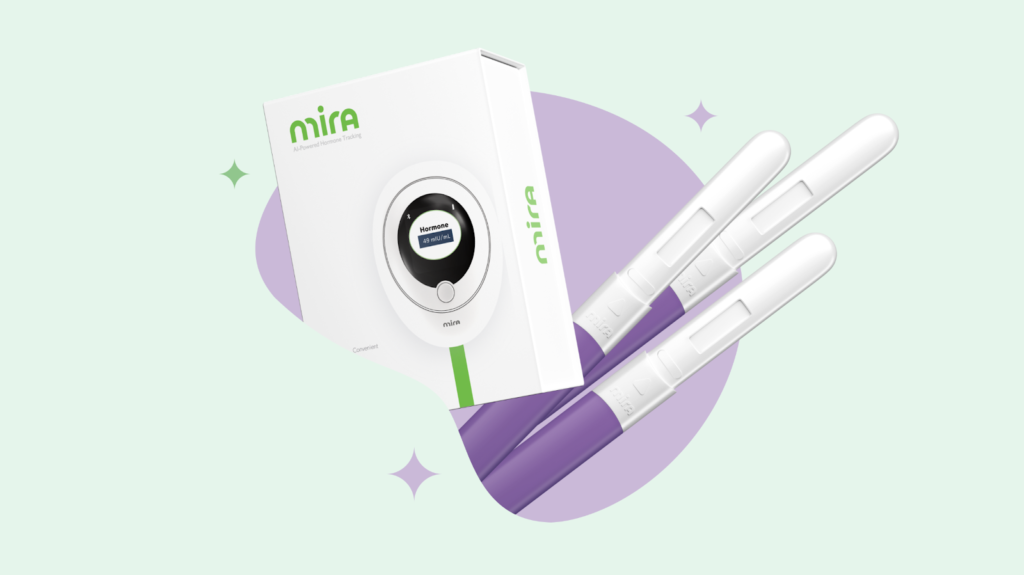Get Pregnant in 2024: Building Your Fertility Plan

Planning a pregnancy is an exciting and emotional time for couples – but it can be quite overwhelming, too. Many feel pressure to conceive as quickly as possible, while others deal with neverending questions (and oftentimes unsolicited advice) from friends and family members. Not to mention, the air of uncertainty surrounding pregnancy can be difficult to manage mentally and emotionally.
So as you head into 2024 with the goal of getting pregnant, we encourage you and your partner to spend some time creating a fertility plan that is built for success. To help, here is a structured guide designed to help you navigate that process together.
For couples who are just starting
Establish your goals
When it comes to planning a pregnancy, the very best place to start is to establish your goals. We recommend taking a moment to yourself to consider the following questions:
- Do I want to have children? If so, how many?
- Am I willing to change aspects of my lifestyle to improve my chances of getting pregnant?
- How long am I willing to try to get pregnant before seeking assisted reproductive technologies?
- How long am I willing to try to get pregnant before turning to foster care or adoption?
Once you have established your goals, you can then start working towards making them a reality.
Discuss expectations with your partner
Now that you have your personal fertility goals, it’s a good idea to speak with your partner to make sure that your goals and expectations are aligned. In addition to ironing out the questions mentioned above, you should also discuss things like:
- How much time/money are we both willing to spend on planning a pregnancy?
- How open are we to alternative family planning strategies such as assisted reproductive technology and adoption?
By talking through these difficult questions ahead of time, you can ensure that you start your TTC journey together and on the same page.
Be realistic and kind to yourself
We all have that friend or family member whose pregnancies just seem to come easy to them. However, the difficult truth is that approximately 11% of women in the United States struggle with infertility, and an estimated 10-20% of known pregnancies end in miscarriage.
This doesn’t mean that you should feel discouraged or hopeless about getting pregnant. It simply means that you should be aware of the fact that planning a pregnancy is sometimes a long and bumpy road, and couples should be kind and compassionate to themselves throughout the process.
Get to know your body with health checks and testing
Getting pregnant is a complex biological process requiring multiple systems in the body to be working correctly. To make sure that you start your TTC journey with your best foot forward, checking in with your body and health is a must.
Book a checkup with your doctor or fertility coach
If you haven’t had a checkup in a while, now is a good time to do so. Schedule a “preconception checkup” to discuss general aspects of your reproductive health. This includes your:
- Menstrual cycle patterns
- Hormone levels
- Current medications (including birth control)
- Family health history
- Chronic conditions
- Lifestyle habits
They may also take a number of tests such as a cervical screening, urine test, blood test, pelvic exam, and/or breast exam.
Consider working with a fertility coach
Mira also has a team of fertility coaches who can help guide you through your fertility journey. Fertility coaches support individuals throughout the TTC process by helping them make positive lifestyle choices, build healthy habits, and plan for pregnancy. They can also help interpret Mira charts.
To get started, you can book an initial consultation via our Coaching service.

A little extra support from an expert can go a long way
Book an online consultation with one of our Hormone Health Coaches.
Schedule NowPlease note that fertility coaches do not provide diagnoses, treatment, or medication prescriptions. Mira’s fertility coaching services are designed to offer education, promote well-being, and extend emotional support.
Take control: you can test a lot from home
In order to conceive, your reproductive hormones must be functioning correctly. Thankfully, there are lots of different tests you can take from the comfort of your home to help you better understand your fertility status and cycle characteristics.
Understanding your fertility status
Our blood says a lot about our fertility. For example, we can estimate how many eggs we may have left, determine how much medication may be needed for IVF or IUI egg stimulation, figure out why we’re not having a period, confirm that we’re approaching menopause, and the list goes on!
At-home test kits like Mira’s Panorama Fertility Lab Test enable individuals to get answers to these questions (and many more) about their fertility within only three days – empowering them to make informed decisions about their reproductive health.
In addition to female hormone testing, sperm testing can also be done from home. Typical at-home sperm tests will provide you and your partner with insights on sperm volume, motility, and concentration levels – see our recommended Home Sperm Test.
Monitoring your cycle to predict ovulation
Another important element of conception is making sure that you are having sex with your partner at the right time each cycle – i.e. around the time of ovulation.
There are lots of different ways to predict ovulation. However, one of the most accurate ways to do so is by testing your fertility hormones directly.
If you are under the age of 35, we recommend monitoring LH, E3G, and PdG levels with the Mira Max Starter Kit. By tracking your numeric hormone levels, you can accurately chart your 6-day fertile window, predict ovulation, and confirm that ovulation occurred.
If you are over the age of 35, we recommend monitoring FSH in addition to LH, E3G, and PdG levels. By tracking FSH, you can estimate how far you are from menopause and better understand your overall fertility health – learn more by checking out our Clarity Bundle.
Although less accurate than direct hormone testing, our Basal Body Temperature (BBT) thermometer is another option for predicting your most fertile days. This budget-friendly tool enables you to measure the rise and fall in your body’s temperature. When measured and tracked over time, you can estimate your day of ovulation. The best part? You can easily sync your BBT data with the Mira App!
Educate yourself
There are a lot of factors at play when planning a pregnancy, and we recommend spending some time educating yourself about the TTC process. A lot of the information you may come across online can feel overwhelming, so try to absorb it in bite-size chunks and only read content that has been verified by an experienced medical professional.
Mira’s own Fertility Course is a great place to start as it provides some structure to the learning process along with an online community for extra support.
Stop bad habits
Unhealthy habits such as smoking, alcohol consumption, and drug use can negatively impact your body’s ability to get pregnant. Other lifestyle factors that can influence fertility include drinking too much caffeine, consuming too much sugar, and being over (or under) weight.
Lifestyle changes are not always easy to make, and it’s important to be kind to yourself and set reasonable goals.
For further information on how our lifestyle influences our hormones and ability to get pregnant, check out our article 13 Ways to Balance Hormones Naturally (Lifestyle Guide).
Set up good habits
On the flip side, it’s also a good idea to set up some good habits that will enhance your fertility. Here are just a few to consider:
- Sleep – getting at least 7 hours of sleep each night is critical for maintaining a healthy weight, feeling good, and keeping stress levels low.
- Diet – eating a well-balanced diet full of fruits, vegetables, lean proteins, healthy fats, and whole grains will keep your body nourished and hormones balanced.
- Exercise – getting at least 150 minutes of moderate-intensity exercise each week will help you maintain a healthy weight while also staying energized.
- Less Stress – keeping stress levels to a minimum through regular relaxation or meditation can help to keep fertility hormones in balance.
- Hormones tracking – being aware of your hormone levels through hormone testing and tracking can help you stay in tune with your reproductive health and plan sex with your partner at the best time each cycle.
- Vitamins and supplements – taking a regular prenatal vitamin can help to maximize your chances of conception and set a potential pregnancy up for the best start.
If you feel that you need some guidance, schedule a consultation with a fertility coach.
Once you have identified areas of your lifestyle where you’d like to implement some changes, make sure to document your plan, integrate it with your schedule, and track your success. This can be done in a simple notebook or in a fertility planning app.
For couples struggling with infertility
Please note that ‘infertility’ is defined as being unable to conceive within one year (if under the age of 35) or within six months (if over the age of 35).
Re-evaluate your goals and processes
If you have been struggling to conceive with your partner, we recommend taking a moment together to really think about your future and re-evaluate your fertility goals. After discussion, some couples may come to the conclusion that they are ready to seek support from a reproductive specialist. Other couples may be ready to explore options for adoption, while others may decide that they are ready to get more serious with ovulation tracking.
Everyone’s goals are unique – so it’s important to really consider what you actually want and set some new goals that are right for your family.
Find a supportive community
Planning a pregnancy can feel so isolating – especially if you are struggling with infertility. However, it’s important to remember that you are not alone in this journey, there are other families across the globe who are in the exact same boat as you are, and most importantly, there is hope.
If you don’t have a local TTC community in your area, there are a number of free groups online that you can join. Our own Mira Community on Facebook is a welcoming and supportive place to turn to when you need a place to vent or ask questions.
Go over your fertility checklist
There are so many lifestyle factors that can influence your fertility. When building your fertility plan for the new year, we recommend re-visiting your fertility checklist and consider making changes in areas that may need improvement.
Have a clear plan prepared together with the doctor
If you have been trying to plan a pregnancy on your own without any luck, now is a good time to make an appointment with your doctor. They can help you put a plan together and assess areas of your health where you may need further medical support.
If you already have a fertility plan with your GP but you’re still not 100% sure about it, you can always get a second opinion from another doctor. Even an online doctor can offer unique insights and ideas that you may not be aware of.
Stress levels are under control
It is a simple fact that stress can negatively impact your ability to get pregnant. In addition to causing hormonal imbalance, it can also cause you to have a low sex drive and a weakened immune system.
If you are serious about getting pregnant but have lots of stressors in your life due to work or personal obligations, it might be time to re-evaluate your responsibilities and put some new boundaries in place.
Other things you can do day-to-day to reduce your stress levels include exercising, yoga, engaging with a creative hobby, journaling, fertility meditation, and therapy.
Healthy lifestyle (food & exercise)
Staying active and eating a healthy diet both play a critical role in your fertility. It not only helps you maintain a healthy weight, but it also keeps your hormones in balance so that ovulation can happen.
If you are looking for inspiration for the new year, we recommend exploring fertility-friendly herbs, pre-pregnancy workouts, and fertility recipes.
Track hormones on a regular basis
It is no secret that planning sex around ovulation is absolutely necessary for getting pregnant.
If you are tracking ovulation with a more traditional method (such as the calendar method, cervical mucus method, or BBT method), but you are still struggling to conceive, it might be time to improve your chances by tracking your hormones directly. This can be done with an at-home hormone tracking system like Mira Hormone Monitor – which was found to be 6X more accurate at predicting ovulation compared to the calendar method in a recent study of 89,388 cycles.

Get a sperm test
Research shows that among all cases of infertility, an estimated 40-50% is due to “male factor” infertility. If you haven’t had your partner’s sperm tested recently or ever before, now is a good time to do so. Thankfully, this can be done from the privacy of your own home with a home sperm test.
Take Prenatal Multi-Vitamins
Prenatal vitamins contain ingredients like folic acid, calcium, and iron which can help to support overall health and ensure a pregnancy is set up for success. Prenatal vitamins are widely available at supermarkets, local pharmacies, and online – see our shop for Mira’s own prenatal multivitamin.
Keep educating yourself
There is so much out there to learn about fertility, and research in the area just keeps getting better. To stay on top of the latest in fertility tools, news, and research, here are a few places that you can turn to:
- The Mira Blog
- Mira’s online course: Boost your Fertility in 8 Science-Backed Steps
- Mira’s free fertility guides and webinars
Final Thoughts
Whether you have just made the decision to start a family or you have been struggling to conceive for some time, we want you to remember that your fertility journey is special and unique to you.
So as you build a plan for the new year, try to resist the urge to compare yourself to others. Instead, fully embrace your own fertility journey and remain compassionate to yourself and your partner throughout the process.

Mira’s Editorial Process
All content produced by Mira meets stringent editorial standards, ensuring excellence and accuracy in language and medical precision. Every piece undergoes thorough fact-checking and review by qualified professionals. Check out our full editorial process to learn more.





